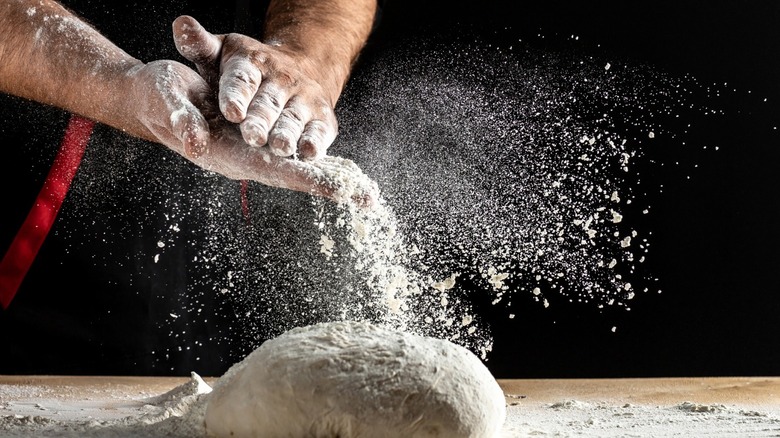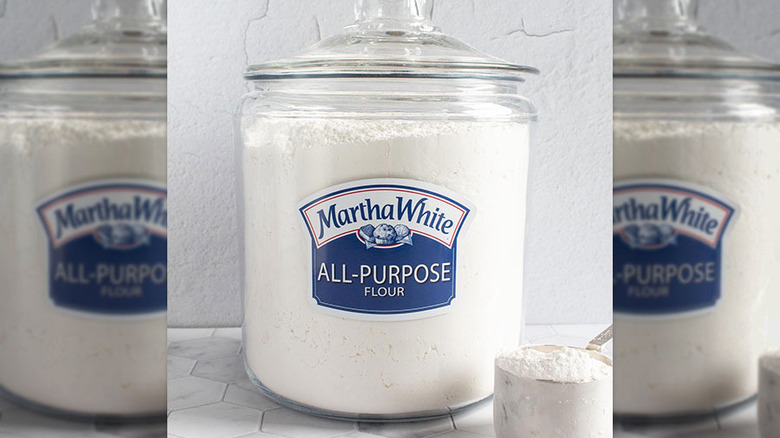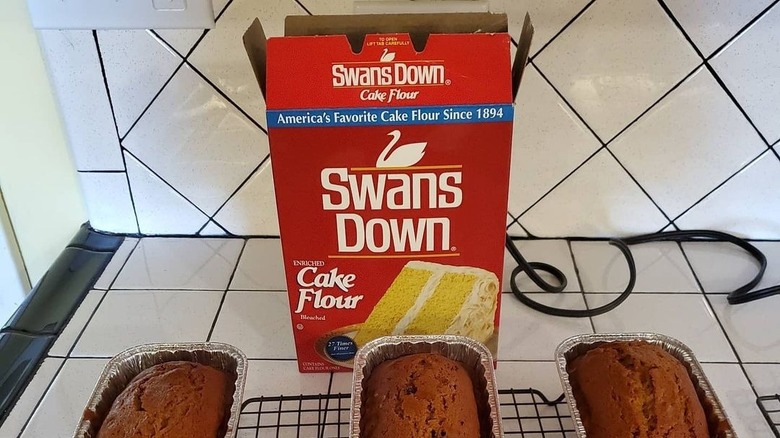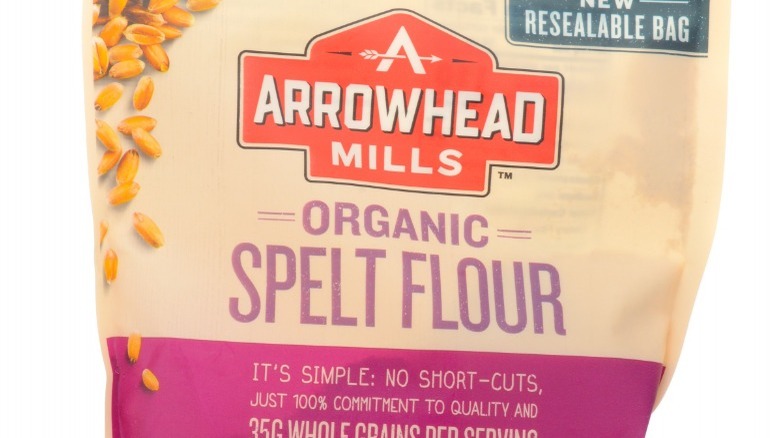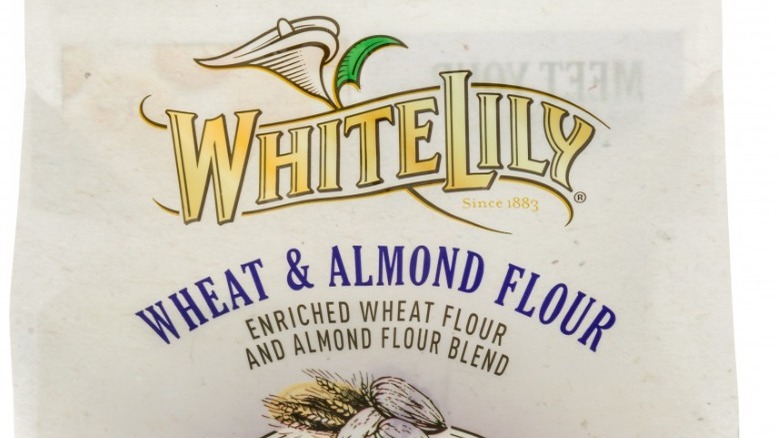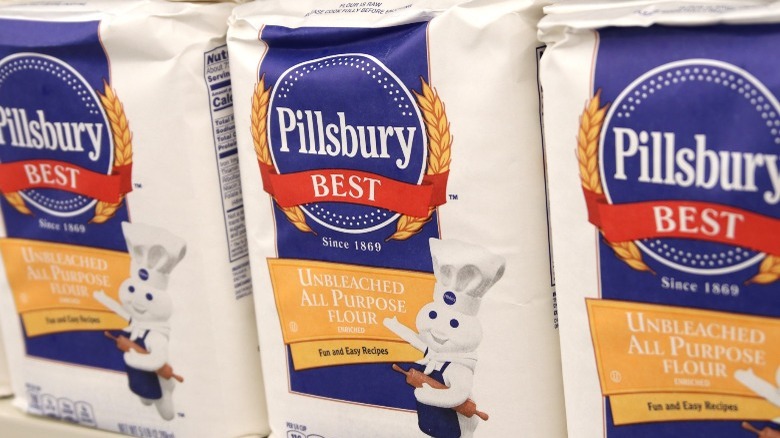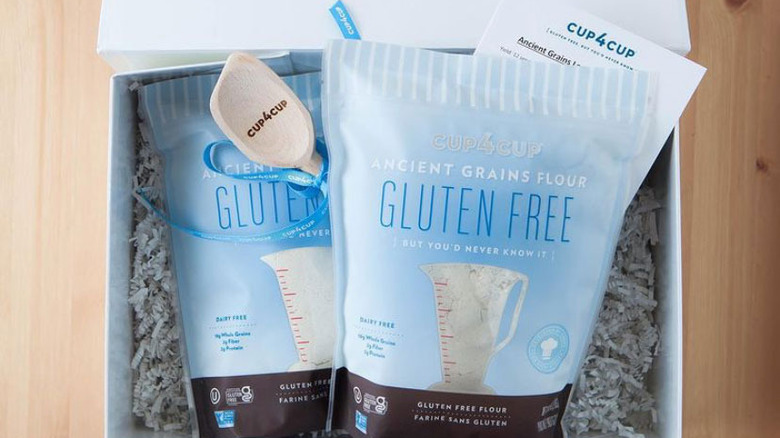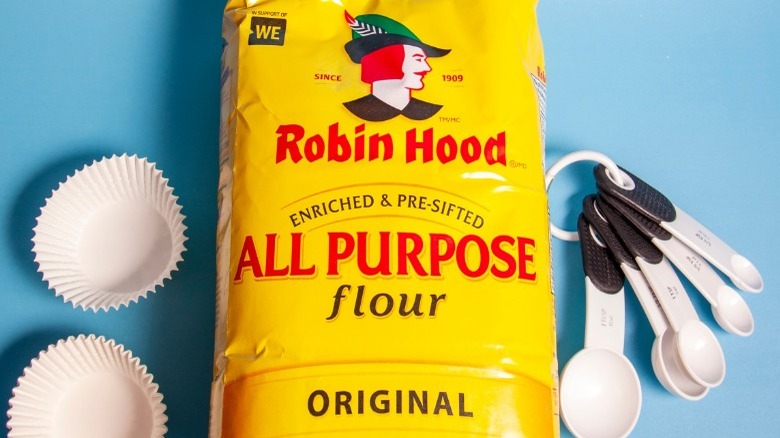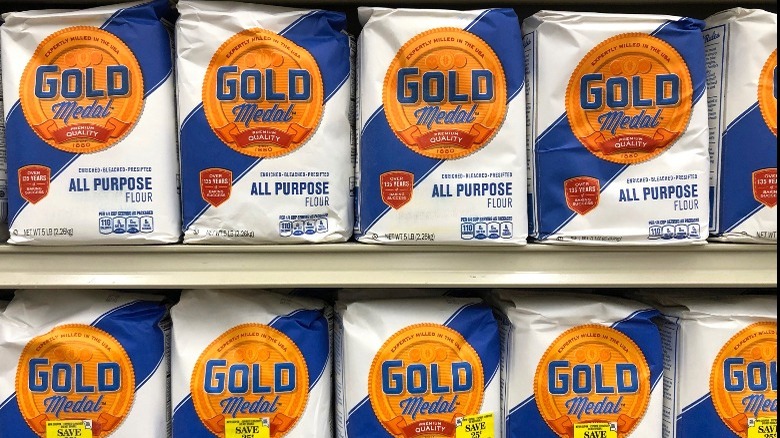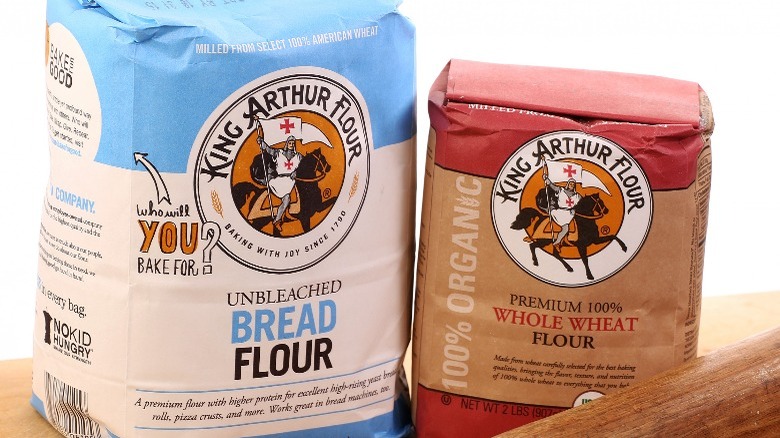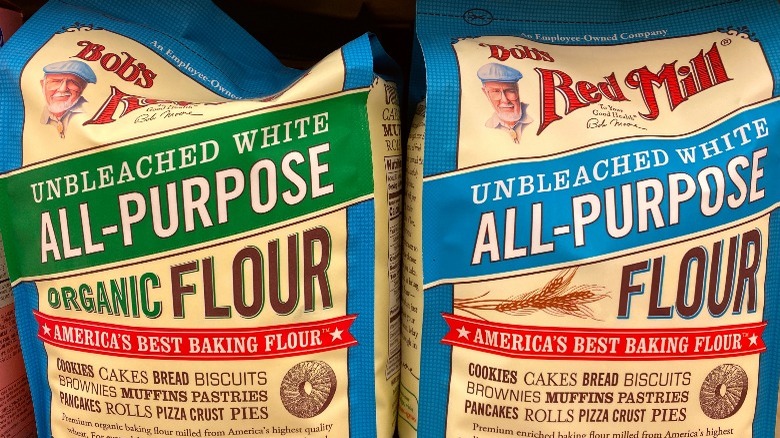10 Flour Brands Ranked From Worst To Best
We may receive a commission on purchases made from links.
Every great cookie, cinnamon roll, and ciabatta begins with the right flour. You trust your favorite flour brands to provide reliable results, but the truth is deeper than packaging. How much can a flour brand do for you, and what's holding back your go-to grocery staple brand from true baking greatness?
The best flour brands deliver consistency across a range of products. After all, no single flour delivers everything a baker needs. Excellent cake flour makes lousy bread, and all-purpose flour isn't really suited to all purposes. More products under a brand name aren't necessarily a guarantee of a higher rating, but variety always helps. The best flour brands make you feel good about using their products by investing in their employees, communities, and the environment — while still delivering a superb product, of course. Here are some of the most popular flour brands you know and use, ranked worst to best.
10. Martha White
This self-rising flour appears most often on Southern shelves, and is known best by biscuit-makers. Martha White Foods became an early champion of self-rising flour and cornmeal, and they were among the first to offer basic baking mixes. They designed their self-rising flour with the goal of minimizing time in the kitchen and streamlining family recipes. Busy home-keepers could – and still do – get to make biscuits with a from-scratch taste with fewer steps. It's biggest appeal hides in the family cookbook, where grandma's recipes may call for it by name.
This flour's greatest strength is also its chief weakness, however. While they are still great shortcuts to traditional baked goods, Martha White's primary products all have too many bells and whistles for other kinds of baking. These include baking soda, sodium aluminum phosphate, monocalcium phosphate, and salt. It's enough to throw off the chemistry for many baking endeavors. If, for example, your recipe calls for baking soda or salt, you'll have to attempt some math or cross your fingers to adjust the measurements. The flour may have more leavening than you need. It may have less. It's hard to tell and easy to miscalculate.
On top of that, the blend of hard and soft winter wheats doesn't deliver the protein needed for things like bread. That restricts the range and efficacy of the brand's all-purpose alternatives, too. Martha White is good for biscuits and pancakes, but it's a gamble for nearly every other kind of baking.
9. Swans Down
Swans Down makes cake flour. Made from the softest part of winter wheat kernels, it's 27-times softer than all-purpose flours. The texture is important for cakes. Because Swans Down is so fine and soft, cakes hold moisture a little better without developing a chewy, bread-like texture. The brand claims to be America's favorite baking flour since 1894.
Unfortunately, the company doesn't just specialize in cake flour. They make cake flour exclusively. Their product is the kind passed down through generations of bakers, but those bakers can only use it in specific recipes like cupcakes, pancakes, and buns. It's another case of a flour company so focused on a single feature it compromises their general utility.
Swans Down offers no unbleached or all-purpose flours. Also, the ultra-sifted nature of their flour doesn't necessarily mean you can get away with skipping the sifting in your recipe. It's been packed in a bag, after all, and physics are physics. Swans Down stands so low in the ranks because, while the cake is delicious, it stands alone. There is only one kind of flour to see here, and the company hasn't tried to spread its wings in any meaningful way.
8. Arrowhead Mills
An organic brand well-known for its non-GMO ingredients, Arrowhead Mills offers lots of wholegrain flours, including gluten-free alternatives for bakers with allergies. All their flours are unbleached, and in addition to white, all-purpose, spelt, and whole wheat flours, they offer flours made from everything from oats to brown rice.
Arrowhead Mills works to make flour buyers can feel good about purchasing. The brand's commitment to environmental sustainability influences all its products. They don't focus on just what type of grain they harvest, or at what time of year they grow crops. Their organic flours come from fields without harmful pesticides or herbicides. Farmers use natural fertilizers, and when possible, the brand buys locally to shrink the environmental impact of carbon emissions from transportation.
As wholesome as Arrowhead Mills' products may be, they take some time, patience, and talent to use in many recipes. They have some problems with consistency, and some Amazon buyers say the flour doesn't rise well. On top of that, the products have a short shelf-life. Finally, blending different types of gluten-free flours may lead to better bakes, but that is a high-effort endeavor with no guaranteed pay-off.
In the end, Arrowhead Mills is full of great ideas and they give bakers lots of options. Unfortunately, the flours may be hard to use and provide underwhelming results. Although this brand is one of the cheaper organic flour providers, your baking may pay the price.
7. White Lily
White Lily has the softest kind of Southern charm, but that doesn't always work to its advantage. Like Martha White and Swans Down, it is made with a very particular cuisine in mind, and this specialization hampers its flexibility.
There's a clear difference between the protein content of the most popular flour brands in the American South versus national brands. White Lily's bleached, all-purpose flour, for instance, has about nine grams of protein per cup. Comparable products from national brands have at least 11 grams of protein per cup. As Wired points out, the difference in flours may stem from cultural tastes, because flours with lower protein generally do better in biscuits and pancakes while high-protein flour makes good bread. White Lily even offers self-rising products to keep breakfast-making simple.
The brand provides bleached and unbleached varieties of its self-rising flour. They also offer unbleached bread flour and bleached all-purpose flour. All their wheat flour comes from the same, red winter wheat, however, and has similar protein values. This is another brand passed down through families, and even the packaging suggests half the brand's appeal lies in nostalgia. Unfortunately, nostalgia has its limits. The brand's biggest fans on Walmart's website swear by White Lily's biscuits, not by the flour's range.
This brand does a few things well, but the truth is White Lily is still a little hung-up on self-rising flours, and the handful of available options sets limits for adventurous bakers and their doughs.
6. Pillsbury
It shouldn't be a surprise that the dough and biscuit brand has its own flour. Fans on Influenster use it for everything from bread, cookies, and pies to arts and crafts projects. The company has been making flour since the 1800s, and its best trait is consistency. General Mills bought the brand in 2001, and it's held to the cereal giant's rigorous standards (via Britannica). That may bring mixed emotions to a certain Doughboy, but it means great things for anyone who wants a flour to behave the same way, every time, in every recipe.
The brand features seven kinds of flour, including all-purpose, self-rising, whole wheat, bread, and unbleached. Two gluten-free choices, almond, and organic coconut round out the list. Pillsbury has all the basics covered, but unbleached or whole wheat versions of its regular flours (all-purpose, self-rising, and bread) would improve the brand's standing. Customers have to choose between flour that's ideal for their baking project or one best suited to their nutritional preferences. You can have bread flour or unbleached flour. You can't have unbleached bread flour.
As part of a mega-company, the truth is Pillsbury flour is a keeper of the status quo. It's straightforward. It's reliable. It doesn't offer much beyond that, but in the name of dense cakes and fallen bread dough, it's worth mentioning just how important consistency is in the kitchen.
5. Cup4Cup
The great problem with gluten-free flours is in their name: they have no gluten. Traditional baking relies on the sticky structures it forms in bread to prevent collapse and make bread chewy rather than crumbly. Although gluten's absence hits hardest in the world of bread-making, every other baked good suffers, too. Bread won't rise, and scones fail to inspire. Non-traditional flours face an uphill battle, and the vast majority fail to reach the summit. Not only do they lack an essential building block for baked goods, but they taste funny. That's why this specialized flour company has placed so high on the list despite its limited number of products.
Cup4Cup is a gluten-free, non-GMO flour that emphasizes taste over chemistry. Its stealthy gluten-free flour is great for cakes and cookies, and it avoids the pitfalls of the competition. According to reviewers on Influenster, the multipurpose flour behaves and tastes very much like all-purpose wheat flour. Two other flour varieties, ancient grains and wholesome offer bakers the chance to explore new flavor profiles with bonus nutrition.
Will your sourdough recipe survive with this flour? Probably not. But your cupcakes will taste right, and you won't have to create your own blend of gluten-free flours every time you want to bake. It is very expensive, unfortunately, which costs it a rank.
4. Robin Hood
This brand takes a shot at everything. They have bleached, unbleached, whole, and organic flours that range from all-purpose to pastry. The brand sells to both private consumers and professional kitchens –- which may be its bigger market.
Robin Hood has a flour for just about any kind of baking. They have four different kinds of all-purpose flour (original, unbleached, whole wheat, and organic). They also offer multiple gluten-free alternative flours, two kinds of bread flour, a cake and pastry flour, and two different blending flours. This goes without mentioning specialty mixes, of course.
One of the greatest problems with this flour is that it's hard to find. It's owned by the Canadian Smucker company and appears most often on Canadian shelves. Everyone else has to shop online or hunt in specialty shops. It still has a surprising range, and features a unique flavor thanks to its blend of hard, red spring wheat and soft winter wheat. That mix also boosts its versatility, which extends as far as traditional biscotti.
3. Gold Medal
The most popular flour in America by a landslide, Gold Medal flour is a picture-perfect kitchen staple. Like Pillsbury, the brand belongs to General Mills and does a good job touching many niches with only eight core products. General Mills produces flour "to specification," which translates as: the same thing goes into every bag, every time, for consistent results. According to the brand's history page, its titular medal on the front of every bag was inspired by the flour's sweeping win of the top three Millers International Exhibition prizes in 1880, and the brand has focused on maintaining that reputation. The company has had lots of time to perfect consistency.
Although far from a specialty flour company, Gold Medal has a firm grasp of the basics. Their all-purpose flours include regular, organic, quick-mixing, and unbleached options. They also produce bread, self-rising, and two different whole wheat flours. It's also easy to find, which sets it above some of the smaller brands on this list.
Despite the name, Gold Medal isn't a flashy brand. Fans on Influenster rave about its reliability, which may not sound exciting, but keep in mind that while exciting bakes make good stories, they rarely end in good bread. Cakes, cookies, and bread turn out well. Still, the brand doesn't go above and beyond in any other sense, so it doesn't get to take home first place.
2. King Arthur
A fun name isn't everything, but every once in a while, a brand tries to live up to its label. King Arthur baking company has been around in one form or another since the 1700s. That's a lot of time to learn and grow, and this company certainly has. The truth of King Arthur flour lies in its products.
They have 41 types of flour and specialty flour blends, with organic and grain-free options filling in the ranks with some variety — and we haven't even mentioned the wheat flours yet ... They provide fine flour designed for cakes and dark rye for the ultimate sandwich loaf. Multiple bread flours help even novice bakers get a good rise on the first try.
One of the brand's greatest claims to fame is the 12.7% protein content of their bread flour. This gives dough the strength to stand and boosts a yeast-based project's chance of success. If that isn't enough for the dough of your dreams, they offer high-gluten flour with 14.2% protein.
The brand makes baking easier with not only the selection but baking classes. Some involve charges, but they highlight their free children's baking education. Employee-owned, King Arthur Baking Company works hard to not just look good, but to actually do good. They even hold themselves accountable via B-Corp, an organization that rates businesses on their engagement, responsibility, and sustainability. Best of all, their flour makes consistently great bread and other baked goods, so they're easy to love.
1. Bob's Red Mill
With dozens of flours for sale, Bob's Red Mill belongs in any kitchen. There are many gluten-free options, flours tailored to specific diets, and 10 different wheat flours.
The extreme variety makes the brand popular with bakers who can't have gluten and prefer a hands-on solution. No single alternative flour can do everything wheat flour does, so some of the biggest Bob's Red Mill fans use the brand's variety to make their own custom flour blends (via Mom's Meet). One may work best for soft cookies, and another may work well for pretzels. This isn't just a gluten-free brand, though. Its wheat flour collection includes an artisan bread variety, fine pastry flour, super fine cake flour, and all-purpose options. The cake flour only has 8% protein, and the whole wheat bread flour goes up to 15%.
The company revolves around health: a healthy business creating healthy food while promoting a healthier future for the planet and community. They source what they can locally and make sure they're trading fairly when they can't. Renewable energy helps power their business, and they get involved with local initiatives to address everything from food waste to recycling. To top it all off, the employees own the company.
Bakers get lots of great flour with the flexibility to bake with, and the business itself reinvests some good in the world. This all makes for a winning combo.
